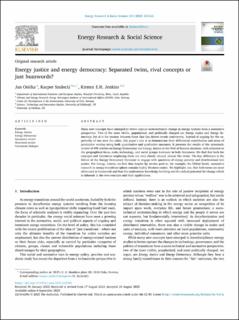Energy justice and energy democracy: Separated twins, rival concepts or just buzzwords?
Peer reviewed, Journal article
Published version
Permanent lenke
https://hdl.handle.net/11250/3124472Utgivelsesdato
2023Metadata
Vis full innførselSammendrag
Many new concepts have emerged to better capture socio-technical change in energy systems from a normative perspective. Two of the most visible, popularized, and politically charged are Energy Justice and Energy Democracy, but it is the tension between them that has drawn recent controversy. Instead of arguing for the superiority of one over the other, this paper's aim is to demonstrate their differential contribution and areas of productive overlap using both quantitative and qualitative measures. It presents the results of the systematic review of 495 articles on Energy Democracy and Energy Justice in the Web of Science database, with attention to the geographical focus, scale, technology, and social groups dominant in both literatures. We find that both the concepts and literatures employing them are very closely related, almost like twins. The key difference is the failure of the Energy Democracy literature to engage with questions of energy poverty and distributional (in)justice. For Energy Justice, we find that despite lip service paid to, for example, the Global South, normative research in energy transitions sphere remains highly Western-centric. We highlight, too, that both terms are most often used as buzzwords and that this undermines knowledge building and the radical potential for change which is inherent in the two concepts and their applications. Energy justice and energy democracy: Separated twins, rival concepts or just buzzwords?

